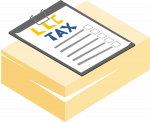Puerto Rico LLC Taxes
Puerto Rico offers great tax incentives to LLCs and individuals who move to Puerto Rico, including a 4% income tax and exemptions from paying taxes on capital gains, interest, or dividends (for individuals and businesses that meet the requirements). As an additional benefit, Puerto Rico LLCs do not need to pay federal income tax on income from Puerto Rico sources. In this guide, we’ll go over the federal, local, and commonwealth taxes your Puerto Rico LLC may need to pay.
In this article, we’ll cover:


How Are Puerto Rico LLCs Taxed?
By default, Puerto Rico LLCs are taxed as corporations. However, both single-member LLCs and multi-member LLCs in Puerto Rico can opt to be taxed as partnerships instead. Puerto Rico LLCs that only earn income from Puerto Rico sources do not pay US taxes on that income, with the exception of taxes for Medicare and social security, which are paid to the US.
You will need to pay federal income tax if you receive income from outside Puerto Rico, or if you do business with the federal government. To file US federal income tax, you’ll use one of these forms:
- Individual Income Tax—Form 1040 (usually Schedule C, but some SMLLCs file C-EZ, E, or F)
- Partnership Income Tax—Form 1065
- C-corporation Income Tax—Form 1120
A Puerto Rico LLC can also elect to be taxed as a Corporation of Individuals, which is similar to S-corp status in the US.
Puerto Rico LLCs taxed as partnerships
LLCs taxed as partnerships don’t pay corporate income tax because they are considered “pass-through entities.” This means the business itself doesn’t pay taxes. Instead, the profits and losses pass through the LLC to the members, who pay individual income tax on their earnings. If you want to change your LLC tax classification from corporation to partnership, you’ll need to file Form 8832 with the IRS.
Puerto Rico LLCs taxed as a Corporation of Individuals
A Puerto Rico LLC taxed as a Corporation of Individuals is taxed as a pass-through entity and doesn’t pay corporate income tax, making it similar to a partnership. However, unlike a partnership, a corporation of individuals can make distributions to its members that aren’t subject to US self-employment taxes. In order to qualify as a Corporation of Individuals, your company must:
- Have no more than 35 shareholders, who must be individuals (with a few exceptions)
- Have only one class of stock
- Derive 90% of its income from Puerto Rico
- Have no more than 10% of your income be passive (income not paid by an employer or contractor)
In order to elect this tax status, you will need to get the approval of all shareholders and file with the Secretary of the Puerto Rico Treasury. You will also need to report your income to the Department of the Treasury annually by filing a Corporation of Individuals Informative Income Tax Return.

Puerto Rico Tax Incentives
Through the Puerto Rico Incentives Code, known as Act 60, Puerto Rico offers a range of tax incentives to businesses and individuals that move to Puerto Rico, including:
- 4% tax on income from Puerto Rico sources
- No capital gains tax
- No tax on interest, dividends, and crypto gains
- 50% reduction of municipal license tax
- Up to 75% reduction of local property taxes
- Up to 50% tax credits for research and development (R&D) expenses
To benefit from these tax incentives, you’ll need to apply through the Single Business Portal. Only businesses owned by bona fide residents of Puerto Rico can qualify for Act 60. Also, businesses that earn over $3 million a year need to hire at least one employee who is a bona fide resident of Puerto Rico in order to continue to qualify for Act 60.
Who counts as a bona fide resident of Puerto Rico?
In order to be legally considered a bona fide resident of Puerto Rico, you need to meet these requirements:
- Live in Puerto Rico for at least 183 days a year. (Certain exceptions are allowed.)
- Don’t have a tax home outside of Puerto Rico.
- Don’t have a closer connection to the US or a foreign country than to Puerto Rico.
Additionally, to qualify for Act 60 tax incentives, you’ll need to purchase residential property in Puerto Rico within two years of moving there.

Puerto Rico Income Tax
If your LLC is taxed as a Puerto Rico corporation, you’ll need to pay corporate income tax. Puerto Rico’s corporate tax rate is 37.5%. However, under the Puerto Rico Incentives Code (Act 60), businesses based in Puerto Rico only need to pay a 4% corporate income tax on goods and services exported from the commonwealth.
If your LLC is taxed as a partnership, your members will pay individual income tax on their earnings. Puerto Rico has a graduated individual income tax ranging from 0% to 33%:
| Taxable Income (USD) | Tax Rate |
| $9,000 or less | 0% |
| $9,001 to $25,000 | 7% of excess over $9,000 |
| $25,001 to $41,500 | $1,120 + 14% of excess over $25,000 |
| $41,501 to $61,500 | $3,430 + 25% of excess over $41,500 |
| Over $61,500 | $8,340 + 33% of excess over 61,500 |
However, individuals that qualify for Act 60 will only pay a flat 4% tax on income that comes from Puerto Rico sources. Income that comes from outside Puerto Rico will still be subject to US federal income tax, which ranges from 10% to 37%, based on income tax bracket.

Sales and Use Tax
The Puerto Rico Sales and Use Tax (SUT) is 11.5%. (10.5% goes to the commonwealth and 1% to local municipalities.) The sales tax for business-to-business services and certain other professional services is 4%. Businesses in Puerto Rico need to register to collect sales tax by creating an account on the Unified System of Internal Revenues (SURI) website.

Puerto Rico Local Taxes
You’ll also need to get a patente municipal (municipal license tax) from the municipality where you do business. Local municipalities can levy a tax of up to 0.5% of gross receipts or up to 1.5% for financial businesses. However, businesses that qualify for Act 60 only need to pay 50% of the municipal license tax. This tax must be paid every six months, on January 15th and July 15th.
If your business owns property in Puerto Rico, you’ll need to pay local property taxes and register with the Municipal Revenue Collection Center (aka CRIM, its Spanish acronym). Businesses and individuals that qualify for Act 60 can receive up to 75% exemption on local property taxes.

Other Taxes in Puerto Rico
Here are some other taxes that Puerto Rico LLC owners should be aware of.
Puerto Rico Employer Taxes
If you plan to hire employees, you’ll need to pay unemployment insurance (UI) tax and contribute to Puerto Rico’s workers’ compensation fund. You may also need to pay Federal Unemployment Taxes (FUTA). Here’s what you need to know:
- Unemployment Insurance Tax—Puerto Rico employers must pay UI tax on the first $7,000 of annual wages paid. The tax rate will depend on the employer’s experience and cannot exceed 5.4%. To register for the UI program, you must create an account on the Employer Services Portal.
- Workers’ Compensation—Puerto Rico has a government-sponsored workers’ compensation fund called CFSE that all employers in the Commonwealth must pay into. The rate will vary depending on the type of work your employees do and the number of employees you have.
Puerto Rico Excise Tax
Goods that are shipped to or from Puerto Rico will be subject to an excise tax, which is paid to the Puerto Rico Department of the Treasury (Departamento de Hacienda). For most goods, this tax is 11.5%, but certain goods have a special excise tax, including:
- Alcohol
- Cement
- Cigarettes
- Crude oils
- Fuels
- Plastic products
- Sugar
- Vehicles

Do foreign LLCs in Puerto Rico need to pay Puerto Rico taxes?
Yes. Foreign LLCs that do business in Puerto Rico need to pay all applicable Puerto Rico taxes. Foreign LLCs that are taxed as partnerships or disregarded entities in the US are taxed as partnerships in Puerto Rico.




